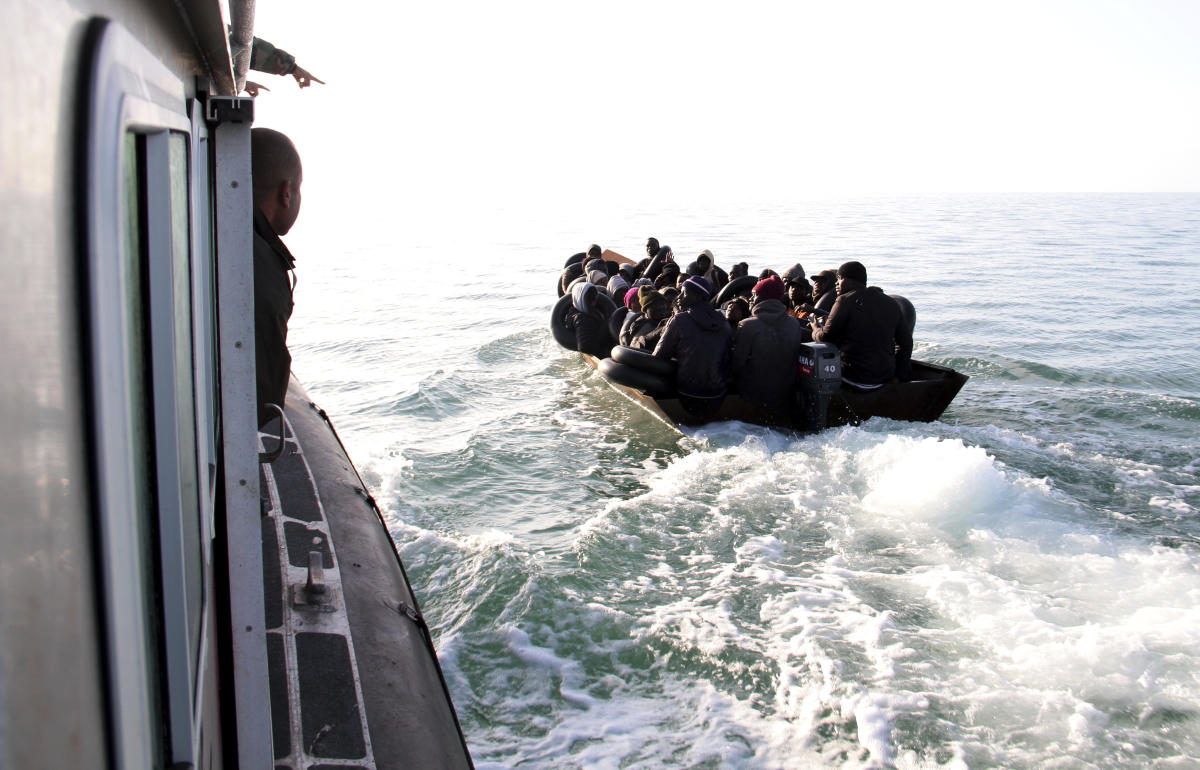EL AMRA, Tunisia (AP) — For many migrants who have long dreamed of Europe, one of the last stops is a vast expanse of olive groves on North Africa’s Mediterranean coast.
But in Tunisia, less than 100 miles (161 kilometers) from the Italian islands that form the European Union’s outer borders, that dream has become a nightmare for many.
Under black tarps covered with blankets and ropes, men, women and children take shelter from the sunlight and wait for their chance to board one of the iron boats used by paid smugglers to transport people to Italy. They are fleeing war, poverty, climate change or persecution and are stuck in Tunisia. They cannot reach Europe but have no money to finance a return home.
Based on unofficial estimates, the U.N. International Organization for Migration says it believes 15,000 to 20,000 migrants are stranded in rural olive groves near the central Tunisian coastline. Their presence is a byproduct of the anti-migration policies championed both in Tunisia and across Europe, especially by right-wing politicians who are expected to gain ground in the European Union’s parliamentary elections this week.
The camps have grown in size since last year as police have driven migrants from cities and stepped up efforts to prevent their crossings across the Mediterranean.
When police destroyed tents in Sfax, Tunisia’s second-largest city, last summer, many migrants moved to the countryside near the coastline north of the city.
Among them is Mory Keita, a 16-year-old who left a flood-prone suburb outside Abidjan, Ivory Coast, last September to connect with a friend already in Tunisia. Keita arrived at an encampment called Kilometer-19 earlier this year.
Kilometer-19, named after a highway marker showing the distance to Sfax, is notorious for clashes between migrant groups, he said. ‘Machete fights’ regularly break out between groups that sort themselves by nationality – including Cameroonians, Ivorians, Guineans and Sudanese. If the police come, it is not to ensure security, but to disband camps by force, Keita said.
“The truth is, I’m scared of where we are,” he said. “Innocent people are getting hurt. The police do not intervene. It is not normal.”
Without a passport, Keita said he paid a smuggler an initial sum of 400,000 Central African francs ($661) last year to transport him through Mali and Algeria. He dreams of settling in France, finding work and sending the income back to his family in Ivory Coast.
Keita boarded a boat in the Mediterranean in March, but Tunisia’s coast guard intercepted him, arrested him and returned him to the nearby beach without any bureaucratic treatment, he said.
With European funding and encouragement, the Coast Guard has successfully prevented more migrants like Keita from making dangerous sea journeys than ever before. From January to May, nearly 53,000 migrants have been unable to cross the maritime border into Europe, Interior Minister Kamel Fekih said last month.
Fewer than 10,000 migrants have successfully crossed from Tunisia to Italy this year, compared to 23,000 in the same period last year.
This meets the goals outlined by European leaders last summer when they signed a 1 billion euro ($1.1 billion) deal with Tunisia. Although the funds have not yet been fully disbursed, the deal included 105 million euros ($114 million) for migration-related programs. NGOs such as the Catholic Committee Against Hunger and Development have criticized the lack of transparency and information about the programs.
While landing fewer people on Italy’s shores appears to be a success, the resulting standoff on the Tunisian coast is fueling anger and despair among migrants and Tunisians. Civil society groups have demanded the government deport migrants. Politicians have urged residents to form “citizen militias” to police the area.
“You brought them here and it is your responsibility to send them back to their homeland,” said Moamen Salemi, a 63-year-old retiree from nearby El Amra, during one of several recent anti-migrant protests.
The UN High Commissioner for Human Rights said last month that he was “deeply concerned about increasing attacks in Tunisia on migrants, especially from sub-Saharan Africa, and on individuals and organizations helping them.”
“We are witnessing an increase in the use of dehumanizing and racist rhetoric against black migrants and black Tunisians,” the report said in a statement.
While migrants from sub-Saharan Africa have been a political flashpoint, the majority of those who came from North Africa to Italy this year came from Syria, Bangladesh or Tunisia itself.
The government has been accused for more than a year of deporting migrants across the borders with Libya and Algeria, many of whom are later found dead. Tunisia has acknowledged that migrants are being transported by bus to the remote border areas of the two neighboring countries. Yet removing them from areas near the coast does little to address the anti-migrant anger brewing among residents, many of whom have themselves tried to emigrate to Europe in search of greater freedom and better economic opportunities.
The visibility of black migrants in cafes, markets, money transfer offices and city streets periodically triggers xenophobic reactions from locals who are bothered by their presence and from farmers who ask the government to remove encampments from their land.
Their animus echoes comments from President Kais Saied, who sparked racist reactions last year after giving a speech claiming migrants were part of a conspiracy to erase Tunisian identity.
The police presence is strong and the national guard roams the olive towns of El Amra and Jebeniana, where journalists are increasingly unable to report. According to migrants posting them, videos of encampments burning after police raids are circulating on social media, spurred by calls from local farmers. “Disappeared” messages asking for help finding missing people are posted daily in Facebook groups popular with migrants.
“This situation cannot continue and Tunisia will not be a country for the settlement of migrants,” Saied said at a National Security Council meeting in May, where he answered without evidence his questions about nefarious foreign actors pushing to keep migrants in Tunisia. revives.
The EU hopes to limit migration with policies that include development aid, voluntary returns and repatriation of migrants, and forging closer ties with neighboring governments that control their borders.
Despite the plight of those trapped in Tunisia, European leaders such as Italian Prime Minister Giorgia Meloni have hailed the 2023 deal as a model agreement for managing migration. She has visited four times in the past year.
The EU also raised concerns after a group of journalists, migration activists and lawyers were arrested last month – including one for making a comment about migration. It said that “freedom of expression and association, as well as the independence of the judiciary, are guaranteed by the Tunisian Constitution and form the basis of our partnership.”
But despite the democratic backsliding, at no point have officials threatened to cut off aid to Tunisia, which many see as a life raft for Said’s government.
Majdi Karbai, a former member of the Tunisian parliament living in Italy, said the nature of the partnership with the EU had jeopardized democracy in Tunisia and at the expense of human rights for African migrants and Tunisians.
Migrants are likely to continue traveling through Tunisia and Karbai said Saied is using them as fodder for populist rhetoric that positions him as a defender of struggling Tunisians and also to secure more aid from Europe.
“Tunisia makes Europe believe it is doing its job as it should,” Karbai said. “It is good for Saied in terms of his supporters and for his speeches when he says that Tunisia will not be a country that resettles migrants.”
___
Follow AP’s coverage of migration issues at https://apnews.com/hub/migration







